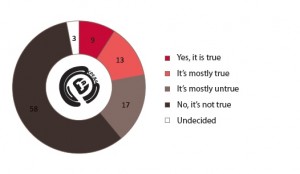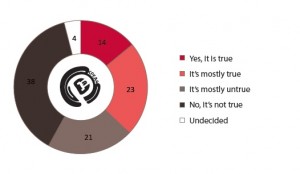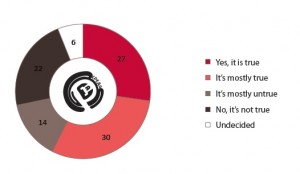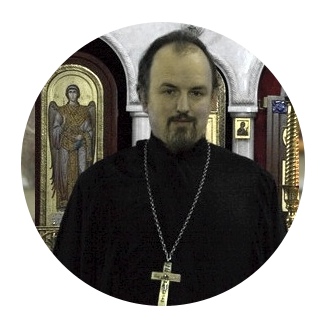Astrology, evil eye and fortune-telling
08/24/2011“Philosophy and medicine have made the man the wisest among the animals, numerology and astrology – the most insane, superstition and despotism – the most miserable”
Diogenes
The results of the All-Russian representative survey conducted by the service SREDA (field work: Public Opinion Foundation “PENTA”, sample 1500 people)
More than half of all Russians believe in the possibility of the evil eye and spoilage, more than a third admit that they listen to astrological forecasts and more than a fifth of Russians have resorted (or resort) to fortune telling.
More often a tendency towards superstition is shown by poor respondents and health professionals: they often listen to astrological forecasts, and resort to fortune telling.
Less superstitious are more frequently from older generations (55 and older).
Women are much more superstitious men.
While continuing the study on superstition among Russians, the SREDA Service has considered several indicators of superstition. The following were covered: astrological forecasts, belief in the evil eye and spoilage, and the use of fortune telling.
Please state whether you find the following true or false: “I believe in the possibility of the evil eye and spoilage.”
More than half of Russians (57%) believe (or mostly believe) in the possibility of the evil eye and spoilage.
Women – impressionable by nature, are more likely than men to believe in the possibility of the evil eye and spoilage (69% women against 44% men).
The poor believe in the possibility of the evil eye and spoilage more often. On the other hand, middle-class Russians who can afford to buy large household appliances mostly tend to doubt the existence of the evil eye and spoilage.
Among those more likely to believe in the evil eye and spoilage are Russians with higher education (or incomplete higher education), pupils and students, childless respondents, respondents with two children and those who are not interested in politics.
Believers in the evil eye and spoilage are much more frequently found in rural areas. In contrast, those who do not believe in these phenomena are frequently residents of major cities (apart from Moscow). Muscovites fall within the overall sample average.
The possibility that the evil eye and spoilage are possible is more often claimed by respondents from the Urals and Far Eastern federal districts. Residents of the Central Federal District, on the contrary, do not generally believe in the evil eye and spoilage.
The evil eye and spoilage are found possible by one third of non- religious respondents (these showings are significantly below the overall average) and two thirds of the Orthodox who participate in parish life (this is above the average).
Please state whether you find the following true or false: “I pay attention to astrological forecasts.”
More than a third of Russians (37%) admit that they pay attention to astrological forecasts. Women pay attention to these predictions much more often than men: almost a half of all interviewed women (46%) said they tend to listen to astrologists, whereas men were more likely to say they pay no attention at all (69%).
Astrological forecasts are more often looked at by respondents working in the field of medicine and health care (54%), those engaged in the trade and services sector (48%), and civil servants of the state and municipal government (44%). On the contrary, entrepreneurs are less likely to listen to “predictions of the stars.”
The poor who cannot find money for clothes more often report that they pay attention to astrological forecasts.
More often than on average, astrological predictions are important for the supporters of the “Edinaya Rossiya”, for Russians who are planning to go to the presidential elections 2011 – 2012 and for those who consider themselves unhappy.
Respondents with higher or incomplete higher education are less likely to report that they listen to astrological forecasts. Conversely, those with only a high school diploma pay more attention to astrology.
More likely to ignore astrological forecasts are childless respondents, those who are interested in political life but do not support any particular party, and Russians who consider themselves healthy.
It is interesting to note that young people between 18 and 24 years are more likely than on average to listen to astrological forecasts, while Russians over 65 years are in the lead among those who do not pay attention to astrology.
The area of residence does not affect preferences regarding astrology.
With regard to the federal districts, those who pay attention to the predictions of astrologers more often live in the Far East and Ural federal districts. Residents of the Siberian Federal District are more likely to report that they do not listen to astrological predictions. Respondents living in the Northwest Federal District, more than on average struggled with choosing a particular answer.
Turning to religion, among the non-Orthodox Christians there was not a single respondent who said they pay attention to astrological forecasts. The most likely to pay attention to predictions of astrologers are respondents who believe in God but do not profess a particular religion. Orthodox Christians of the Russian Orthodox Church tend to, a little above the average, listen to astrological predictions.
Please state whether you find the following true or false: “I have resorted or resort to fortune telling.”
Relatively few Russians (22%) have resorted (or still resort) to fortune telling.
Women are four times more likely than men to try and learn about their future through fortune telling (34% of women against 8% of men).
More likely to resort to fortune telling are specialists, respondents working in the field of medicine and health, as well as citizens who have only one child.
More likely to report that they had never resorted to fortune telling are Muscovites, people over 65 years, and affluent Russians.
More likely to try to learn about their fate by means of fortune telling are residents of the Urals and Far Eastern federal districts. Respondents from the Central and Siberian federal districts are more likely than on average to say that they have never resorted (do not resort) to fortune telling.
Those who believe in God but do not profess any particular religion are again in the lead in terms of superstition: they are more likely to admit that they have resorted to fortune telling. In contrast, those who believe in God and belong to a particular religion resort to fortune telling no more than on average.
Looking at all three indicators, we find that women are more likely than men to believe in all sorts of ‘public-use supernatural’ – fortune telling, astrological forecasts, the evil eye and spoilage. Men are more skeptical in this sense.
Also more skeptical attitudes are displayed by people over 55 years, while young people are more likely to believe in the evil eye and spoilage, fortune telling and predictions of astrologers.
Superstition is closely connected with respondents’ education – the more education, the lesser the tendency towards superstition.
Among religious people – the most serious attitude towards horoscopes, fortune telling, the evil eye and spoilage is displayed by those who believe in God but do not belong to any particular religion. Muslims and Orthodox Christians often believe in the possibility of the evil eye and spoilage, but Muslims have resorted (resort) to fortune telling less than on average, and the Orthodox no more than on average.






